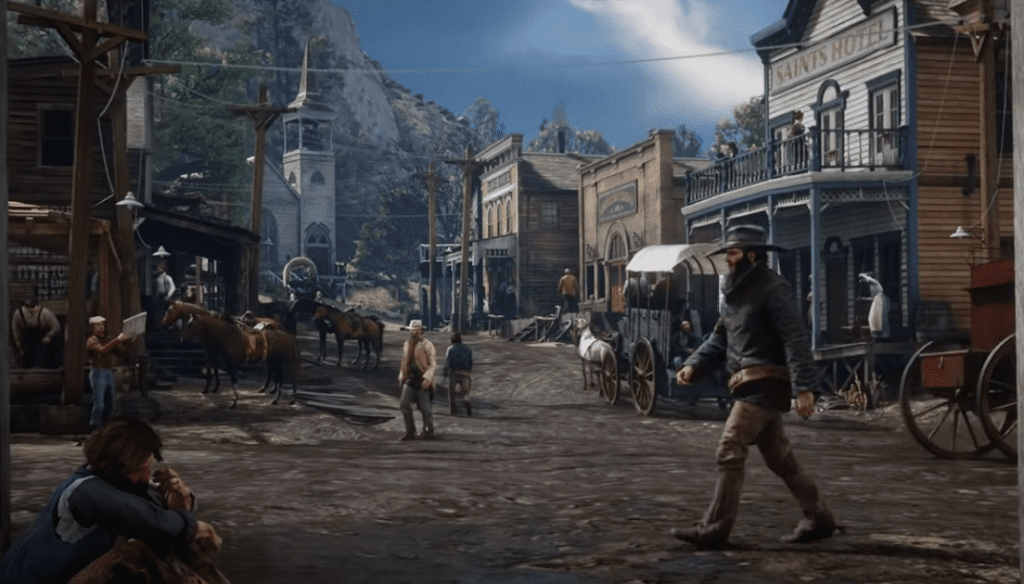There once was a time when engaging gameplay was all a game needed to be successful. As game production technologies evolved, so did the games themselves. In their humble beginnings, games were no more than 2D pixelated graphics moving on a tiny screen.
Today, we have experiences for every kind of gamer out there – including (almost) photorealistic games – which helped them become an integral part of popular culture. So much so that gaming is listed as the fifth most popular hobby in the United States according to Statista.
But what makes a video game a masterpiece? Sure, you could argue that graphics and gameplay are important, and we agree. However, there’s something else that can take a game from being “just great” to truly memorable and impactful: storytelling.
In this article, you will learn everything about storytelling in video games, its importance, and some games with incredible storytelling (and how they use it to tell extraordinary stories).
Let’s get started!
Read also: How to make a JRPG: crafting your epic adventure in 5 steps
Storytelling in video games: what is it?
In society, storytelling – the art of creating and telling a story – has been around for a long time. People have always used stories to share traditions, cultural values, and historical events, and even pass knowledge down to the next generation.

At first, these stories and tales were only shared through oral means, but, as time went on, technologies appeared and advanced, allowing us to write them down and later, with the invention of the printing press in the 15th century, to mass produce copies by the millions. Nowadays, with television, movies, and other forms of digital media being so present in our lives, we have a myriad of ways to share and experience stories with other people. Unsurprisingly, storytelling is also present in video games, introducing itself through dialogues, cutscenes, character actions, in-game lore, gameplay mechanics, and much more. But why is it so important?
Why is storytelling important in games?
Storytelling is important in video games because it helps to create a more immersive and engaging experience for the player. When a game has well-written characters and a compelling plot, the likelihood of drawing a player in and keeping them interested increases by a lot. It can even serve as an organic marketing tool, as players discussing the game’s lore and coming up with hypothetical scenarios can generate significant buzz in social networks.
While stories are usually the central point in role-playing games (RPGs), adventure games, and many more, not all titles make extensive use of storytelling techniques. The classic Mario games are outstanding examples of games that have a very simple plot – save a damsel in distress from the big bad – but give players a goal to achieve. This in turn helps them get filled with determination, making them more likely to actually beat the game (and uncover other secrets on the way, who knows?).
Game developers can also use storytelling as a powerful tool for conveying complex themes and messages to the player. By using the characters, the events, and other elements in the story, game developers can explore highly intricate and nuanced ideas and emotions that go beyond the surface level of entertainment.
For example, it’s a game can use its plot to discuss themes such as love, loss, betrayal, and/or redemption. Through the choices and actions of the player and other non-playable characters (NPCs), the game can explore these themes in a way that makes the player think and feel. This will usually lead to deeper and more meaningful experiences for them, as they consider and reflect on the themes and messages being presented as they progress through the game.
Furthermore, storytelling in games can be used to shed light on social, political, and environmental issues, giving the player a different perspective on the world and encouraging them to look at these issues in a more thoughtful and empathetic way.
Overall, storytelling is a vital aspect of gaming as it can create impactful and long-lasting experiences for players.
Read also: What is game environment design and why it’s important

Linear storytelling in games
Linear storytelling is a narrative structure where the story unfolds in a predetermined sequence, much like a traditional book or movie. The player’s journey through the game follows a set path, and the events and outcomes are largely fixed, regardless of the player’s actions.
The game progresses through a series of levels and chapters in a specific order. Therefore, key story elements and endings are decided by the game’s designers, not influenced by player decisions.
This storyline is often tightly controlled, allowing for detailed and polished storytelling. Storytelling in which players are carefully guided through, with clear objectives and goals, reduces the chances of getting lost or deviating from the main plot.
This style is often preferred by players who enjoy a structured, cinematic experience with a clear beginning, middle, and end. It allows for a deeper focus on narrative and character development but offers limited replayability in terms of narrative diversity.
Open-ended storytelling style in games
Open-ended storytelling allows players to create their own narrative within a game world. Instead of following a predetermined path, players have the freedom to explore, interact, and make choices that shape their unique experiences. The narrative is less rigid and can evolve based on player actions.
This is the approach of the popular sandbox-style games, in which players can explore a vast, open world with minimal restrictions, engaging in various activities and quests at their own pace.
The story emerges organically through player interactions with the game world, NPCs (non-player characters), and other players in multiplayer settings.
Players have significant control over their character’s development, relationships, and the overall direction of the story. This creates numerous possible outcomes and storylines, influenced by the player’s choices and actions.
Open-ended storytelling appeals to players who enjoy exploration, creativity, and making meaningful choices that affect the game world. It provides high replayability due to the varied possibilities and personal stories that can emerge but may lack the narrative depth of a linear storyline.
Storytelling in branching narrative games
One of the most interesting aspects of storytelling in video games is the role of the player. In many games, the player can make choices that shape and affect the world in many ways. These choices can present themselves as small dialogue options or major plot decisions, such as killing or saving an important character in the story, which can lead the player to wildly different scenarios and endings.
Known as “branching narrative games”, they allow the player to feel more like they are part of the plot, giving them a sense of agency over the events that unfold. These options also make the experience much more immersive and engaging as players feel like their actions have real consequences and are meaningful to the story.
Furthermore, branching narrative games often have great replayability, as the player might want to see how different choices will affect the story. As they try to understand the consequences of their actions, the player will explore its different endings and scenarios, engaging with the story and characters in a deeper way.
All in all, in these games, storytelling is closely tied to the actions the player will take and the way they affect the story. The key challenges with these games are creating a cohesive and believable narrative despite the potential for many different endings and implementing them in a way that feels natural and meaningful to the story. However, if executed properly, you will have an emotionally impactful game with amazing replay value in your hands.
3 games with incredible storytelling
Let’s take a look at three examples of games with incredible storytelling:
Red Dead Redemption 2 (2018)

Set in a fictional version of the American Old West, this critically acclaimed game follows the story of Arthur Morgan, who is part of a criminal gang. The game uses an impressive combination of cutscenes, dialogues, and gameplay to tell a complex and highly nuanced story about morality, loyalty, and what it takes to survive.
Arthur Morgan’s character development throughout the plot is particularly well done, and the game presents many choices that can shape the relationships and dynamics within the gang. The game also does an excellent world-building job. The attention to detail is superb, which helps to create extremely believable characters and immersive environments.
Overall, it’s safe to say that Red Dead Redemption 2 is a prime example of how games can use storytelling elements to tell a rich and engaging story that touches on complex subjects. The game’s combination of strong characters, a compelling plot, immersive worldbuilding, and breathtaking visuals make it a standout in the medium.
The Last of Us (2013)

This Naughty Dog’s action-adventure game follows the story of Joel, a smuggler, and Ellie, a teenage girl, who fight to survive in a post-apocalyptic world ravaged by a deadly fungus that has turned most humans into mindless monsters.
Like Red Dead Redemption 2, The Last of Us uses a combination of cutscenes, dialogues, and gameplay to tell a fantastic story. One of its key aspects is the relationship between Joel and Ellie, and their interactions with each other and the world around them help create a rich and believable world. The game also explores themes of love, loss, and the human condition in a deep and meaningful way.
The plot and storytelling are further enhanced by the top-notch voice acting, animations, character development, and worldbuilding The Last of Us has to offer, making it one of the most memorable and emotionally impactful games ever released on the market. In fact, it made so much success that HBO is going to release a TV adaptation later this year – and let’s hope it won’t repeat the same mistakes Game of Thrones did.
By the way, did you know that The Last of Us is one of the best-rated games of all time according to Metacritic?
Life is Strange (2015)

In this episodic adventure game developed by Dontnod Entertainment, you follow the story of Max, a teenager who discovers she has the ability to rewind time, and her relationship with Chloe, her best friend.
Storytelling is a key element in Life is Strange, as the player’s choices affect how the story ends and the relationships between the characters. Throughout the game, the player will be presented with a variety of choices, which can have immediate or long-term consequences, creating a sense of agency and encouraging players to think through their actions and their potential consequences.
Furthermore, Life is Strange does an outstanding job of conveying the feeling of being a teenager and all the issues that come with it, using storytelling elements effectively to tell a thought-provoking and emotional story.
Interactive video game narratives: engaging stories in gaming
In the realm of video games, storytelling serves as a cornerstone, enhancing the player’s experience and engagement. From narrative-driven games like “The Walking Dead” by Telltale Games to iconic titles such as “Bioshock,” the art of weaving a story in a game has transformed the industry.
Unlike traditional forms of storytelling, video game storytelling lets players participate actively, choosing how the game’s story unfolds. This interactive element creates a unique bond between players and the game’s world. As in “Mass Effect,” where choices impact the narrative, or in “Gone Home,” where exploration reveals layers of a narrative, video games offer a dynamic way of conveying stories. Games like “The Wolf Among Us” and “Pac-Man” showcase the diverse spectrum of storytelling forms within the medium, from spoken or written narratives to simple visual elements.
In today’s gaming landscape, it’s evident that the story in a game holds a special place in the hearts of both gamers and game designers, proving that effective storytelling remains a key element in shaping memorable gaming experiences.
Read also: 10 exciting ideas for video games to spark your creativity
Wrapping it up
In conclusion, storytelling is an essential element of video games, often going hand in hand with great gameplay. Through the clever use of characters, plot, dialogue, voice acting, and gameplay mechanics, game developers can use storytelling elements to create mesmerizing and captivating experiences that explore a variety of themes and emotions.
Whether through traditional storytelling methods or branching narrative games, the art of telling stories is in constant evolution, and the game industry is always pushing the boundaries of what is possible. Who knows what kinds of emotional and thought-provoking games will be created using current state-of-the-art technologies, such as Virtual Reality?
Speaking of creating games, are you ready to take your game’s storytelling to the next level? We at Main Leaf are ready to help you out. We are a game development studio with a team of 70+ highly qualified professionals, and our expertise is sure to bring your vision to life.
Since 2010, we have been creating fantastic games on demand and have a proven track record of success. Let us help you craft an impactful story that will both engage and immerse your players!
Interested in working with us? Make sure to request a game quote right now – we will get back to you in 24 hours!

